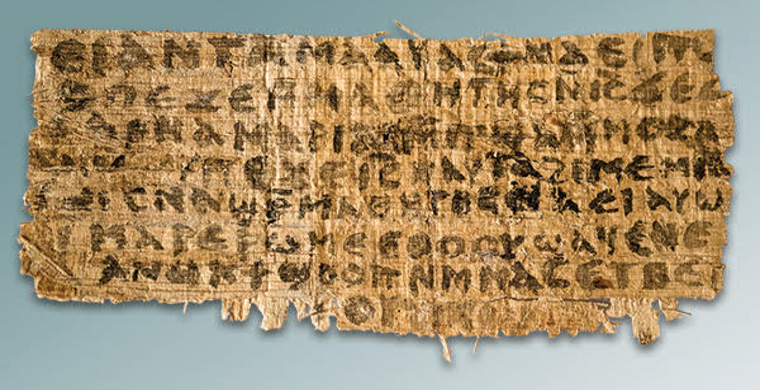PREDISPOSED
By Duane W. H. Arnold, PhD
Special to VIRTUEONLINE
www.virtueonline.org
October 15, 2020
Recently, I read the book, 'Veritas' by the Atlantic journalist, Ariel Sabar. The subtitle of the book, 'A Harvard Professor, A Con Man and the Gospel of Jesus' Wife' gives you a bit more of an idea as to the content. Essentially, the book lays out the story of how a professor in the Divinity School at Harvard, Dr. Karen King, was taken in by a German con man. To quote the publisher:
"In 2012, Dr. Karen King, a star professor at Harvard Divinity School, announced a blockbuster discovery at a scholarly conference just steps from the Vatican: She had found an ancient fragment of papyrus in which Jesus calls Mary Magdalene "my wife." The tattered manuscript made international headlines. If early Christians believed Jesus was married, it would upend the 2,000-year history of the world's predominant faith, threatening not just the celibate, all-male priesthood but sacred teachings on marriage, sex and women's leadership. Biblical scholars were in an uproar, but King had impeccable credentials as a world-renowned authority on female figures in the lost Christian texts from Egypt known as the Gnostic gospels. "The Gospel of Jesus's Wife"--as she provocatively titled her discovery--was both a crowning career achievement and powerful proof for her arguments that Christianity from its start embraced alternative, and far more inclusive, voices."
The only problem was, the papyrus fragment was a fake.
I was interested in the story of how this happened. During my doctoral work I had the opportunity to work on the translation and interpretation of a similar fourth century papyrus that dealt with the subject of my dissertation. It was something that I knew that I was unable to manage on my own. Thankfully, rescue came in the person of Prof. David Thomas, who was one of the then leading lights in the Oxyrhynchus Papyri project. Working with him on a weekly basis for almost a year, I had some sense of just how difficult such work can be. Oftentimes, owing to a blurred letter or a hole in the papyrus, one's conclusions had to be tentative. Moreover, Coptic grammar, even if the full sentence is in evidence, is difficult at best. So, I wanted to read the book to examine how this particular academic came to such definitive conclusions that were based, in the end, on such little evidence, and fraudulent evidence at that.
Through the course of the book, it turns out that Dr. King was predisposed by her upbringing, her course of education, her main interest area of female voices in Early Christianity, and, it seems, by her academic ambition, to be taken in by this forgery. Indeed, it seems possible that the perpetrator of the forgery may well have known her background and targeted her accordingly. What is less understandable, however, is why Dr. King ignored contrary evidence such as provenance, peer reviewed study of the papyrus, and scientific analysis of the fragment, choosing instead to rush forward with her conclusions? After all, this was not Dan Brown writing 'The DaVinci Code' in which evidence and facts did not matter. This was a senior academic, at one of the world's leading universities, publishing her conclusions in leading scholarly journals.
It would appear that, at the end of the day, the answer is somewhat simple. Like Fox Mulder in the X-Files, she wanted to believe. In wanting to believe, she discounted any evidence that failed to bolster that belief.
Most of us have prejudices of one sort or another, that is, preconceived opinions or a certain bias, not grounded in evidence or facts. Most of us can recognize such prejudices and, hopefully, reconsider our motives and actions. To be predisposed, in one way or another, is another more subtle state of mind. For instance, being an Anglican has nothing to do (I hope!) with being prejudiced. If, however, one loves English history, English literature, choral music, a certain aesthetic sense, and/or a love of liturgy or ceremonial, one might be considered predisposed to be an Anglican. The same could be said, reflecting perhaps different elements, of Roman Catholicism, Eastern Orthodoxy or even of evangelical mega-churches or the small Baptist church down the road. We even use phrases such as, "I feel at home" when we find those places that seem to match our already extant inclinations or tendencies.
There is, however, a serpent in the garden.
Merely because I want to believe, I cannot ignore the contrary evidence of conduct and belief merely on the basis of my personal predisposition. This is to say, that if I am a Roman Catholic, I cannot ignore the plague of sexual abuse that has taken place. If I am an Anglican, I cannot set aside the mess that the Anglican Communion has become over the course of recent decades. If I am a Baptist, I must be honest about what has been taking place in the Southern Baptist Convention. And, yes, if I am an evangelical, I cannot ignore the evidence of politicization that we see happening day by day and week by week. If we allow our own predispositions to blind us, we too will be at the mercy of the fake and the fraudulent in our churches and, ultimately, in our faith.
Duane W.H. Arnold, PhD
The Project














